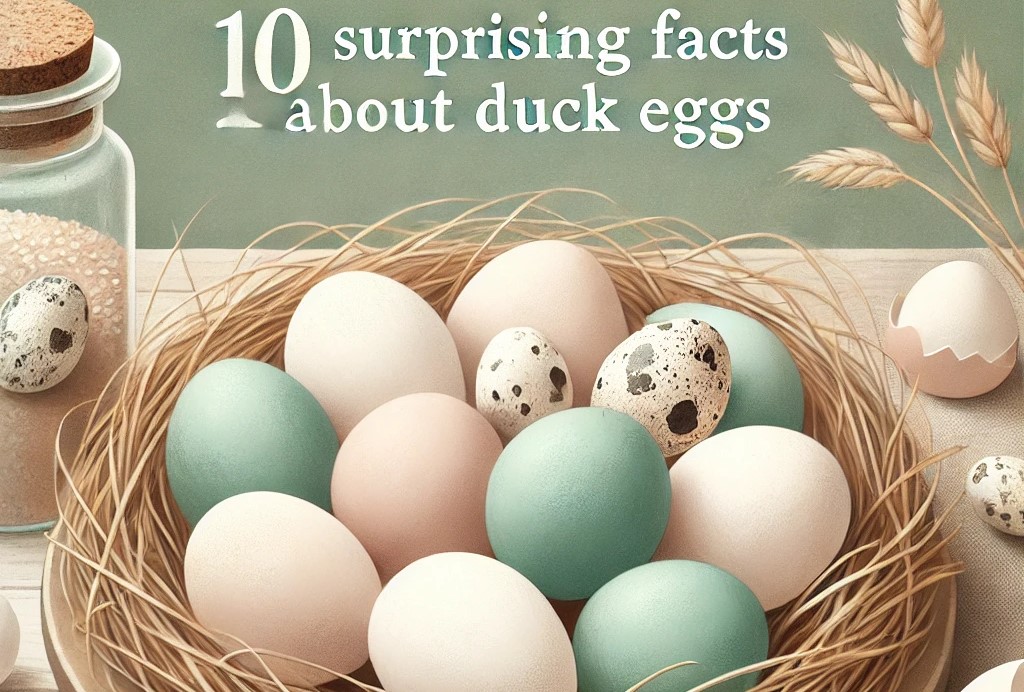Email: blogagri2@gmail.com
12 Surprising Facts About Duck Eggs

Are you curious about the hidden wonders of duck eggs? Get ready to embark on a fascinating journey as we crack open 12 surprising facts about these culinary gems. From their unique size and appearance to their impressive nutritional profile, duck Are you interested to know what duck eggs can offer? Then sit tight while we disclose 12 cool facts regarding them. Contrary to being just another kind of poultry, duck eggs are quite versatile due to their larger shape and unusual visuals along with their high nutritional value.
In This Article, We Will Share:
- Why Duck Eggs Are Healthier Than Chicken Eggs,
- Their Other Possible Applications.
- How They Can Be Hypoallergenic Too.
Firstly, get ready to be astounded as we take you through the delightful journey of duck eggs. You will learn how everything from their savoury taste to their history gives them an edge over chicken eggs. So, without any further ado, let’s decode the secret as to why we think duck eggs will become your new favourite cookware!
Surprising Size and Appearance of Duck Eggs
Have you ever asked the question, “How exactly do duck eggs differ from chicken eggs in terms of usage and application?” Let’s take a deep dive into these intricately built oval-shaped objects.
If you pick a duck egg up, you will notice it is considerably larger than a standard chicken egg – around the size of a medium avocado. Now, imagine grabbing an avocado with a moderate hand; that is the size we are implying to.
Ducks lay eggs that are bluish-green due to the pigment in bile while chickens lay eggs with considerably lighter coloured shells. These eggs must truly contain magic; however, they are not the only ones to surprise us.
Duck eggs do not only differ in their structure but also their taste and functionality.
When you crack open a duck egg, you will see that its yolk is much more enlarged and colourful than that of a chicken egg. In fact, it can be easily put into the same category as a pink ball in comparison to a golf ball!
These features of duck eggs are also unique in comparison to chicken eggs. These singularities provide a great hint at the type of nutrients that duck eggs have alongside the culinary possibilities they offer.
💡 Key Takeaways: Duck eggs contain all nutritional advantages that chicken eggs do and have more modifications to their flavour and colour, as they are greener in colour along with having a stronger egg yolk.
Nutrition Power
Duck eggs have a lot of nutritional value just like chicken eggs, but when they are compared together, it can be said that duck eggs surpass them in terms of nutrition. Duck eggs are also substantially richer and more nutrient dense than chicken eggs.
Decoding Protein
Duck eggs have almost 9 grams of protein integrated into each egg, whereas chicken eggs do not surpass the 6 grams mark. This results in a difference of almost 50 percent, which is substantial. In short, if you want to opt for protein in your diet, duck eggs are the more fitting option.
The Fat Factor
Owing to the much larger size of duck egg yolks, the overall percentage of fat has increased too. Do not let all that information terrify you. The general form of fat in them is unsaturated. In fact, duck eggs are rich in omega 3, which is beneficial for your heart and brain.
Vitamin Boost
Duck eggs are loaded with nutritional goodness! They contain more A, more of the B vitamins, and more D than chicken eggs. It’s like a multivitamin given to us by nature in an egg form.
Cholesterol Concerns
Duck eggs do contain much cholesterol – about twice that of chicken eggs, now that is true. Dietary cholesterol intake does not make a major difference in blood cholesterol levels in most men and women, recent studies indicate. However, if you are sensitive to cholesterol, you should watch how much you eat.
Rich in Protein and Vitamins
In combination with other nutritious substances, duck eggs allow you to maintain the health of the entire body. Duck eggs are especially helpful to:
- Build and repair muscles
- Strengthening the immune system
- Eye protection and improvement
- Healthy skin and hair
Consider duck eggs as miniature nutritional bombs filled with everything that is good for your body. They are like a super protein version of eggs!
💡 Key Takeaways: Those eggs are much denser in nutrients than chicken, as they provide a larger quantity of proteins and healthy fats along with vitamins, which are key when looking to improve one’s diet and nutrition.
The Unique Taste Profile of Duck Eggs
Have you ever wondered how it feels to savour such an egg that is generally regarded as ‘milder’ but instead always savours like a duck egg? If not, allow me to explain.
The greatest aspect of a duck egg is its unparalleled richness when compared to a chicken egg. Simply said, it is like contrasting a dark chocolate with a plain one: both can be enjoyed, but one has a much busier and fuller flavour.
This richness is a result of the enormous egg yolk, which has a more powerful egg flavour and a creamier consistency than normal egg yolk. Others, however, believe that it has simply a faint gamey taste that is somewhat comparable to any other waterfowl meat.
The best thing of a duck egg is the opacity of the egg yolk because of its thickness. When cooked, it becomes more jelly-like than a chicken egg yolk, which significantly alters the way it feels inside a person’s mouth.
These duck eggs have a culinary taste that always appeals to chefs because they improve the dish and make the composition commercially more worthwhile to savour.
💡 Key Takeaways: Duck eggs outperform chicken eggs in egg taste savouring due to their thicker egg yolk and more pronounced egg feel composition, and they are greatly sought after among chefs.
Use in Kitchen
Duck eggs can be classified as the all-purpose eggs, as they are good for many recipes. What makes them especially good is that they have unique qualities that heads of the kitchen indeed treasure!
Baker’s Delight
When it comes to baking, duck eggs are everything one could ask for and more. The additional layer of protein that egg whites have gets to bind the overall cake or pastry, thus delivering thicker pastry and delicious fluffy cakes. It’s as if your baked goods have a hidden perk up!
Luscious Hollandaise
Duck eggs have a larger and richer yolk, which has given an edge to using it in sauces, it can be used in hollandaise sauce or even French rice vinaigrette. Makes it easier to picture using duck eggs in yolks that require yolks – richer taste sauces. It’s like going from coast to coast in style – it’s first class all the way!!
Ideal Poached Eggs
Duck egg white that has a stronger protein structure means it stays intact when poached. Fewer white wisps in your Eggs Benedict.
Cute Fried Eggs
Drench a duck egg in oil, and what you will get are crispy edges and a runny yolk which compliments the crispy edges, aka how a duck egg is supposed to be, meaning it is perfect!
Delicious Scrambled Eggs
Duck scrambled eggs have more consistency and are certainly richer than chicken eggs, meaning every other morning you would be served delectable and scrape-able duck scrambled eggs.
Keep in mind that, due to their dimension and consistency, duck eggs tend to do things in a tad different manner.
They may require more time to prepare and cook, but one’s end product is worth the wait!
💡 Key Takeaways: Duck eggs are beneficial in the kitchen since they can be used for a variety of purposes such as for bread, sauces as well as for egg dishes.
Duck Egg Shell Characteristics
In general, the duck egg shell is made from kidney beans which are harder than chicken egg shells. Cracking a duck egg the same way you crack a chicken egg may catch you off guard.
The reason why duck eggs are thicker is:
- In terms of Protection: The duck egg is good for the developing duckling.
- In terms of Freshness: Due to the thicker shell, the egg will remain fresh for a longer period.
- In terms of Strength: It makes the eggs less prone to cracking when handled.
To begin with, there is little doubt that duck eggs are harder to crack than chicken eggs. Its hardy structure demands that a practical amount of force be applied to even crack it open. As a result, ducks egg formulation or rolling out of the nest in case of laying season can be a bold and painful process!
To the naked eye, deep fried duck eggs are bizarrely sized in comparison to a chicken egg, which to an extent is true. This is mainly attributed to the firmer and densified shell that needs to be cracked off before the egg can be cooked. Wait time is indeed a small price to pay.
💡 Key Takeaways: Duck eggs are more robust when compared to chicken eggs due to their dense circumfusing, making them the ideal layers as they can withstand more damage which is highly beneficial for their nesting period.
Production and Egg Laying Habits of Ducks
It’s no secret that while ducks and chickens have similar traits when it comes to egg laying, there are a lot of pragmatic differences. The process of laying eggs for a duck would be ideal for egg production!
Generally speaking, ducks gravitate towards laying eggs early in the morning just like a chicken would. However, the rate at which a duck lays its eggs will differ from that of a standard chicken. Here’s how it usually goes:
- Seasonal layers: For some breeds of duck, egg laying is heavily seasonal, typically with spring and summer being the target months.
- Year-round layers: In contrast, some other breeds such as the Indian Runner find great joy in laying all year round.
Put from a different perspective, depending on the breed, they can lay 200–300 eggs a year which puts them on schedule for laying an egg daily.
Have you ever wondered when ducks hyper-produce eggs during the winter? That’s because they are not like chickens; they can keep laying even when it’s colder outside and they make great egg producers in the cold.
Diverse Factors Affecting Duck Egg Laying
Duck laying eggs is a complex affair which depends on numerous factors, i.e.
- Duck breed: Khaki Campbell breeds are certain champions when it comes down to egg production.
- Diet: Layer feed should always be of high quality to dictate layer enjoyment.
- Environment: A self-contained duck house with the right heating and light will enhance laying.
- Age: Ducks too have an egg laying ratio, which reduces as they begin to age.
So, in short. it is highly crucial that the right elements are provided so that you can continue getting the delectable duck eggs.
💡 Key Takeaways: Ducks in contrast to other chicken breeds have a much more diverse egg production, considering the context of seasonal and annual prediction time, as season, breed, age, and diet also play a huge role in increasing egg production.
Storage and Shelf Life of Duck Eggs
Storage is critical to ensure lasting enjoyment of fresh duck eggs. Here is the important information:
- Beer pong: Fresh duck eggs can be left out on the counter for up to a week.
- Freezer: If you anticipate not using duck eggs for a while. Then refrigerate them for up to six weeks.
- Cleaning: Store duck eggs in such a way that no washing is done until usage. Because, unlike shop-bought chicken eggs, fresh duck eggs come coated.
- Storage: Use their narrow sides to keep the yolk centred along with an air pocket at the top.
- Life Hack: New eggs are heavier than water, and stale eggs are lighter.
A fresh duck egg is a delicacy in its own right. So ensure you store them properly to relish that rich egg whenever you feel like!
💡 Key Takeaways: Duck eggs can be stored at room temperature for about a week or refrigerated for up to six weeks. Moreover, proper handling maintains their freshness and quality.
Potential Allergies and Sensitivities
There are individuals sensitive to duck eggs even if they are a tasty and nutritious replacement for chicken eggs.
About two percent of the population has an egg allergy, which is quite prevalent among children. There are individuals with chicken egg intolerance who may tolerate duck eggs and vice versa.
This can cause a duck egg allergy that may present with any of the following symptoms as mentioned below:
- Skin reactions: hives, eczema, etc.
- Nausea and cramps.
- Wheezing or coughing.
- Lastly, anaphylaxis in severe cases.
So in case you exhibit any of these symptoms and already have an egg allergy, you should consult an allergist first before you consume duck eggs. Think of it as ensuring a safety net before you carve new culinary experiences.
Everyone else who does not have such allergies can safely eat duck eggs; however, people should be a bit cautious because some individuals are sensitive to certain foods, so that additional caution while introducing any new food is also beneficial.
💡 Key Takeaways: Foods such as ducks egg are better off avoided unless one is confident they are not allergic. Because even small amounts of duck eggs can trigger an allergic reaction.
Duck Egg Availability and Pricing
It may be a bit harder to locate than chicken eggs. Therefor, it may come off as a tad challenging to find them. They’re not in abundance in regular supermarkets, so do not shy away from looking for them as well!
It can be located at the following places:
- Farmer’s Markets: Some local duck farmers practice selling their product directly to customers.
- Grocery shops: Some health-oriented stores keep stock of duck eggs.
- Asian markets: A lot of Asian dishes utilise ducks egg in their recipes.
- On a few selected websites, duck eggs are available that are shipped from a local farm.
- Certain Local Farms: Look in your state for farms that focus on Maryland duck eggs.
Pricing-wise, it is apparent that duck eggs cost more than chicken eggs; the reasons for this are as mentioned below:
- Decreased supply: Ducks tend to produce fewer eggs compared to chickens.
- A rare commodity: The low availability means they are a high-value item.
- Measured in total amount: The expression “more bang for your buck” is apt in this situation.
Regard it as purchasing a high-end item. The taste that is coupled along with its nutritional value is more than enough reason for an average egg lovers.
Cultural Significance of Duck Eggs
You can begin seeing the remarkable duck world and discover that duck eggs are embedded in many cultures.
Chinese people relish salted eggs. These eggs are salty and are often consumed during the Moon Festival or included in Congee.
In the Philippines, a fertilised duck egg embryo known as balut. It is widely accepted as a delicacy and as street food for the masses.
Similarly in France, these eggs are used in the preparation of sauces and custards.
People in the United Kingdom eat British pickled eggs. This has been popular as a snack in pubs for several generations.
These, and more, are gaining popularity on social media platforms, such as TikTok. Home cooks are now more creative than ever and utilise these eggs to bake and create gourmet nutrition-packed breakfasts.
💡 Key takeaways: Duck eggs have universal use in various forms of cuisines including delicacies as well as contemporary cooking, demonstrating their importance across cultures.
Color Variations of Eggs
ducks eggs can range in colour, from white to blue, and are quite the sight! You can picture this as a duck’s surprising Easter egg hunt!
Ducks have eggs of different colours depending type of duck that lays them. Here are the types with relevant eggs.
- White: Pekin ducks lay white eggs.
- Blue-green is a lovely colour that Indian Runner ducks are famed for when they lay eggs.
- Cream: I have a Khaki Campbell duck that lays cream eggs.
- Grey: It is notable that Muscovy ducks lay slightly grey white coloured eggs.
Out of all the eggs, I personally adore the Indian Runner’s egg due to its soft blue-green tint as well as for its beautiful look. It’s like discovering a robin’s egg in your egg carton!
Nutrient-wise and taste-wise, the eggs are the same no matter the colour; it’s the inner contents that truly matter!
💡 Key Takeaways: Ducks egg colors vary widely depending on the breed, ranging from white to blue-green to gray, adding a colorful dimension to their appeal without affecting their nutritional value or taste.
Cooking Recommendations
Excited to try your first duck egg? Here are some tips to ensure you long reap the rewards of it. Duck egg’s initial tasting starts with becoming a little alarmed; hence, one tip is don’t overexploit the egg.
- Try Fried Duck Egg first as you will profoundly enjoy.
- When baking with duck eggs, use 1 duck egg for every 1.5 chicken eggs.
- Handling the duck egg yolk requires special attention as it is larger in volume and easy to break.
- Contrasts are not a surprise: In contrast to chicken eggs, duck egg white tends to appear more translucent and has a thicker texture.
- Bring on the Time: Considering the size of a duck egg, it may require an extended period in the oven.
During this challenging time of your first attempt you may feel a bit uneasy. But with the help of these tricks, you will gain good insight into becoming a professional duck egg user.
Read Also: Where to Have a Chicken Brooder: An Instructional Paper to Witness Optimal Growth of Chicks
Ending Notes
As we conclude our journey and summarize the key points discussed throughout this guide. We can confidently claim that duck eggs are the best choice, without a doubt. Their exceptional nutritional profile certainly sets them apart from the competition, whether you’re raising ducks or simply enjoying their eggs.
So, what are you waiting for? With all the knowledge and skills you’ve acquired from this guide. You can now fully utilize duck eggs and make the most of them in your cooking. I wish you the best of luck and hope you create some exciting and delicious culinary masterpieces!




